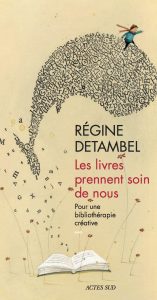
Les livres prennent soin de nous ACTES SUD
Les Livres prennent soin de nous. Pour une bibliothérapie créative (Actes Sud, 2015)
Le point de vue de l’éditeur
Aussi loin que l’on remonte dans l’Histoire, on trouve l’intuition d’une vertu thérapeutique du livre et du récit. Les livres soignent. Ils ont le pouvoir de nous apaiser par l’ordre de leur syntaxe, le rythme et la musicalité de leurs phrases, le toucher sensuel de leur papier… Les récits et les romans ont ce pouvoir étonnant, dans le mouvement de la lecture, d’arracher à soi-même et à sa douleur, en proposant des fictions enveloppantes et du sens toujours renouvelé.
Dans la détresse physique ou psychique, dans le handicap ou la grande vieillesse, le livre permet d’élaborer ou de restaurer un espace à soi. Contre la passivité et la perte d’autonomie, la lecture est la reconquête d’une position de sujet. C’est ainsi que la bibliothérapie a pour effet d’élargir nos existences étriquées et toutes tracées, et de les relancer vers des horizons insoupçonnés.
Tandis que fleurissent les plates recettes du « bonheurisme », Régine Detambel, écrivaine et bibliothérapeute, s’est donné pour tâche de montrer que la littérature comme remède doit se défier tout autant du pouvoir médical que des lieux communs du bien-être de masse.
Régine Detambel propose une formation en bibliothérapie créative. Le présent ouvrage recense quelques-unes de ses sources théoriques et les grandes lignes de sa pratique.
Se renseigner sur la formation en bibliothérapie créative : regine.detambel@orange.fr
Voir les vidéos de Régine Detambel sur la bibliothérapie créative : cliquez ici
Presse
La Grande Librairie (France 5, 16 avril 2015), visionner ici
Le Grand Journal de Canal+, 9 avril 2015, présentation par Augustin Trapenard.
TF1, Journal télévisé du 4 avril 2015.
Livres Hebdo, 19 mars 2015.
Lire, avril 2015.
France Inter, L’Heure des rêveurs, 17 avril 2015, écouter ici
Le Nouvel Observateur, entretien avec Anne-Sophie Hojlo, avril 2015.
Le Pèlerin, entretien avec Muriel Fauriat, avril 2015.
L’Express, « Le soin de soi », par Estelle Saget, 8 avril 2015.
Micmag.net, « Les récits ont ce pouvoir étonnant« , avril 2015.
Salon Littéraire, « Quand les mots guérissent nos maux », avril 2015.
Le Monde des Livres, le feuilleton d’Eric Chevillard, 24 avril 2015.
L’Express, 29 avril 2015.
L’Orient littéraire, numéro 107, mai 2015.
La Bibliothèque Médicis, LCP, 3 juillet 2015.
Télérama, juin 2015.
Sciences Humaines, n° 273, juillet-août 2016, Les pouvoirs de l’imaginaire. La littérature aide-t-elle à vivre ? par Héloïse Lhérété.
__________
The Fine Books Blog
Bibliotherapy – The Healing Power of Books
BY BARBARA BASBANES RICHTER
Talk therapy is nothing new, but how about bibliotherapy? I’m not talking about self-help publications, but rather using literature as a means to physical and psychological salvation. And really, who else but the French, the beneficiaries of a literary patrimony that dates from the 9th century, would be at the vanguard of such a movement.
Régine Detambel, award-winning author of more than thirty books and a Chevalier of Arts and Letters, is also a licensed physiotherapist, and maintains that bibliotherapy, in some form or another, dates back to antiquity. Many of her books (La Splendeur, Opéra sérieux, Son corps extrême,) explore the aging process and how to live (and die) with grace. As a writer and as a physiotherapist, she is a healer with her hands, and Detambel believes that literature can be found everywhere – in the air we breathe, in our bodies, and in the various liminal moments of our lives (birth, marriage, death). “Everything is literature if we know where to look,” Detambel graciously wrote to me, explaining bibliotherapy in detail: “I didn’t create bibliotherapy. It existed in ancient Greece and Rome, and was revived after World War I to heal soldiers who had experienced psychological trauma at the front.” Poetry and literature became part of her “creative bibliotherapy” (bibliocréativité as Detambel coined it), and has found immense success and personal satisfaction through her efforts. “I think that working with the energy of an author, with poetry and metaphor, with stylistic and textual arrangements and so forth is extremely effective to revitalize the psyche,” Detambel continued. “We are all beings of language, and so it is necessary to move and to shift the language that resides within us so that our efforts are rewarded positively.”
Detambel has played with the idea of bibliotherapy for as long as she has put pen to paper, but it was after writing a short story about skin (Petit éloge de la peau, Folio, Gallimard, 2006) that she recognized an analogy between skin and paper. “Books are caresses, in the strongest sense of the term!” she wrote. Hosting daylong seminars from her hometown nestled in the southern region of Languedoc-Roussillon, Detambel teaches aspiring bibliotherapists — nurses, doctors, psychologists, booksellers and librarians — how books can help people better understand themselves and to reconnect with the world. “There’s more to bibliotherapy than just handing a book to someone and leaving them alone. There’s a certain rapport between the text and the body that must be considered too. Even before one’s eyes settle on the text, we must consider body posture, breathing, voice, and other physical considerations. I teach my trainees how to renew the dialogue between words and the body.”
Some of Detambel’s most rewarding work happens at retirement facilities, where she meets people whose psyches are often “abandoned, because culture is so rarely allowed to pass through the doors of establishments set up for the elderly,” she explained. “I don’t want these people to be left without words that could help them reestablish contact with their internal world. These people live in a sterile, naked, even cruel world. And unfortunately, they’re not alone.” Books themselves aren’t the cure, but they can be part of a curative program where literature nourishes the body, mind, and soul.
__________

